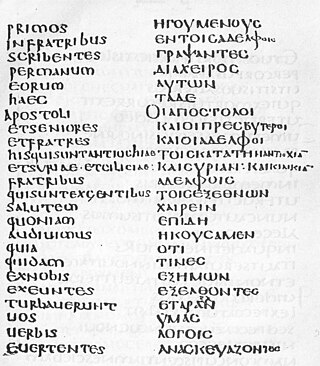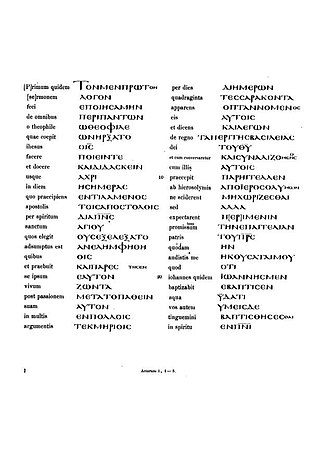
Philip the Evangelist appears several times in the Acts of the Apostles. He was one of the Seven chosen to care for the poor of the Christian community in Jerusalem. He preached and reportedly performed miracles in Samaria, and met and baptised an Ethiopian man, a eunuch, on the road from Jerusalem to Gaza, traditionally marking the start of the Ethiopian Church. Later, Philip lived in Caesarea Maritima with his four daughters who prophesied, where he was visited by Paul the Apostle.

John 4 is the fourth chapter of the Gospel of John in the New Testament of the Christian Bible. The major part of this chapter recalls Jesus' interaction with the Samaritan woman at the well in Sychar. In verses 43-54, he returns to Galilee, where he heals a royal official's son.

Luke 3 is the third chapter of the Gospel of Luke in the New Testament of the Christian Bible, traditionally attributed to Luke the Evangelist, a companion of Paul the Apostle on his missionary journeys. It contains an account of the preaching of John the Baptist as well as a genealogy of Jesus. From the start of this chapter until Luke 9:50, the "shape and outlook" of Luke's Gospel follow closely those of the other synoptic gospels, Matthew and Mark. The Expositor's Greek Testament states that in this chapter "the ministry of the new era opens".

Luke 9 is the ninth chapter of the Gospel of Luke in the New Testament of the Christian Bible. It records the sending of the twelve disciples, several great miracles performed by Jesus, the story of his transfiguration, Peter's confession and the final departure from Galilee towards Jerusalem. Scottish minister William Robertson Nicoll describes this chapter as unfolding "sundry particulars which together form the closing scenes of the Galilean ministry". The book containing this chapter is anonymous, but early Christian tradition uniformly affirmed that Luke the Evangelist composed this Gospel as well as the Acts of the Apostles.

The Ethiopian eunuch is a figure in the New Testament of the Bible; the story of his conversion to Christianity is recounted in Acts 8.

Acts 15 is the fifteenth chapter of the Acts of the Apostles in the New Testament of the Christian Bible. It records Paul and Barnabas traveling to Jerusalem to attend the Council of Jerusalem and the beginning of Paul's second missionary journey. The book containing this chapter is anonymous but early Christian tradition uniformly affirmed that Luke composed this book as well as the Gospel of Luke.

Acts 12 is the twelfth chapter of the Acts of the Apostles in the New Testament of the Christian Bible. It records the death of the first apostle, James, son of Zebedee, followed by the miraculous escape of Peter from prison, the death of Herod Agrippa I, and the early ministry of Barnabas and Paul of Tarsus. The book containing this chapter is anonymous, but early Christian tradition uniformly affirmed that Luke composed this book as well as the Gospel of Luke.

Acts 10 is the tenth chapter of the Acts of the Apostles in the New Testament of the Christian Bible. The book containing this chapter is anonymous but early Christian tradition uniformly affirmed that Luke composed this book as well as the Gospel of Luke. This chapter records the vision of Saint Peter and his meeting with Cornelius in Caesarea.

Acts 1 is the first chapter of the Acts of the Apostles in the New Testament of the Christian Bible. The book containing this chapter is anonymous but early Christian tradition affirmed that Luke composed this book as well as the Gospel of Luke. This chapter functions as a transition from the "former account" with a narrative prelude, repeated record of the ascension of Jesus Christ with more detail and the meeting of Jesus' followers, until before Pentecost.

Acts 6 is the sixth chapter of the Acts of the Apostles in the New Testament of the Christian Bible. It records the ordination of the first seven deacons and the work of one of them, Stephen. The book containing this chapter is anonymous but early Christian tradition uniformly affirmed that Luke composed this book as well as the Gospel of Luke.

Acts 9 is the ninth chapter of the Acts of the Apostles in the New Testament of the Christian Bible. It records Saul's conversion and the works of Saint Peter. The book containing this chapter is anonymous but early Christian tradition uniformly affirmed that Luke composed this book as well as the Gospel of Luke.

Acts 11 is the eleventh chapter of the Acts of the Apostles in the New Testament of the Christian Bible. It records that Saint Peter defends his visit to Cornelius in Caesarea and retells his vision prior to the meeting as well as the pouring of Holy Spirit during the meeting. The book containing this chapter is anonymous but early Christian tradition uniformly affirmed that Luke composed this book as well as the Gospel of Luke.

Acts 13 is the thirteenth chapter of the Acts of the Apostles in the New Testament of the Christian Bible. It records the first missionary journey of Paul and Barnabas to Cyprus and Pisidia. The book containing this chapter is anonymous but early Christian tradition uniformly affirmed that Luke composed this book as well as the Gospel of Luke.

Acts 19 is the nineteenth chapter of the Acts of the Apostles in the New Testament of the Christian Bible. It records part of the third missionary journey of Paul. The author of the book containing this chapter is anonymous but early Christian tradition uniformly affirmed that Luke composed this book as well as the Gospel of Luke.

Acts 21 is the twenty-first chapter of the Acts of the Apostles in the New Testament of the Christian Bible. It records the end of Paul's third missionary journey and his arrival and reception in Jerusalem. The book containing this chapter is anonymous, but early Christian tradition uniformly affirmed that Luke composed this book as well as the Gospel of Luke.

Acts 22 is the twenty-second chapter of the Acts of the Apostles in the New Testament of the Christian Bible. It records the event leading to Paul's imprisonment in Jerusalem. The book containing this chapter is anonymous but early Christian tradition uniformly affirmed that Luke composed this book as well as the Gospel of Luke.

Acts 23 is the twenty-third chapter of the Acts of the Apostles in the New Testament of the Christian Bible. It records the period of Paul's imprisonment in Jerusalem then in Caesarea. The book containing this chapter is anonymous but early Christian tradition uniformly affirmed that Luke composed this book as well as the Gospel of Luke.

Acts 24 is the twenty-fourth chapter of the Acts of the Apostles in the New Testament of the Christian Bible. It records the period of Paul's imprisonment in Caesarea. The book containing this chapter is anonymous but early Christian tradition uniformly affirmed that Luke composed this book as well as the Gospel of Luke.

Acts 25 is the twenty-fifth chapter of the Acts of the Apostles in the New Testament of the Christian Bible. It records the period of Paul's imprisonment in Caesarea. The book containing this chapter is anonymous but early Christian tradition uniformly affirmed that Luke composed this book as well as the Gospel of Luke.

Ephesians 4 is the fourth chapter of the Epistle to the Ephesians in the New Testament of the Christian Bible. Traditionally, it is believed to have been written by Apostle Paul while he was in prison in Rome, but more recently, it has been suggested that it was written between AD 80 and 100 by another writer using Paul's name and style. This chapter is a part of Paul's exhortation, with the particular section about the mutual interdependence of the Christians as the church and how they should live in the world (4:17–5:20).














